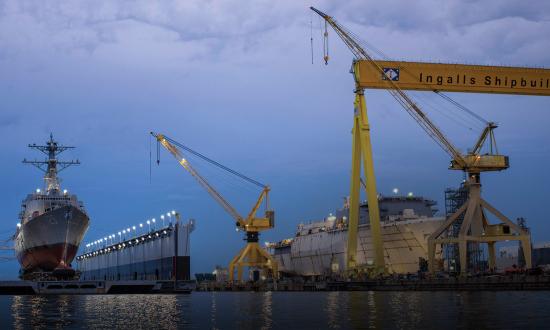Captain Ray Brown, U.S. Coast Guard (Retired)
The Coast Guard might consider making its merchant inspection arm more akin to what the Federal Aviation Administration is to the airlines. This regulatory arm of the Coast Guard develops a culture much different from the operational folks—not better. Just quite different in experience and thinking.
Midshipman Third Class Webster Lowe, U.S. Naval Academy
Marine environmental protection should be removed. Between 2011 and 2020, out of approximately 6.8 million Coast Guard man-hours, only 0.15 percent were spent on marine environmental protection. The Environmental Protection Agency can fulfill the Coast Guard’s duties in this mission.
Raymond Birnbaum, U.S. Coast Guard Auxiliary
Ice operations might be eliminated, as the Arctic ice recedes, with port ice operations relegated to the private sector. However, I am not sure this is a wise option as other nations attempt to stake a claim to Arctic resources.
Bertil Haney
The Coast Guard has only been involved in the licensing and certification of merchant mariners since World War II. Before that, it was done by an entirely independent agency staffed by experienced merchant marine officers and, in the opinion of many, done far better than it is now.
Lieutenant Sean M. Meibers, U.S. Coast Guard
The defense readiness mission warps the service into a “part-time navy,” to the detriment of the Coast Guard’s other ten missions. Either the goal or approach to the defense readiness mission needs to be changed.
Sean Plankey, U.S. Coast Guard Veteran
Search and rescue should be removed from the U.S. Coast Guard statutory missions. Search and rescue is outdated given commercial resourcing and technological advances removing the need for “search.” The mission dominates the Coast Guard’s reputation, prohibiting innovation and changes to culture necessary to defend against threats to the homeland.
Commander Ian Starr, U.S. Coast Guard
Drop drug interdiction. The Coast Guard seems to be the only federal agency that still cares about cocaine. For the rest, it is fentanyl and precursors, which come into the country over land. Maritime interdictions are resource-intensive efforts that yield comparatively minimal results. Let other agencies tackle drugs so the Coast Guard can focus on its other missions.
The crew of Coast Guard Cutter Bertholf (WMSL-750) offloads approximately 7,500 pounds of seized cocaine and marijuana in San Diego, California, in March 2021. U.S. Coast Guard (Travis Magee)
Lieutenant Kyle Cregge, U.S. Navy
A Coast Guard statutory mission should be added to enable the protection of living and seabed marine resources. This would assert the Coast Guard’s role in not only fisheries but also the eventual enforcement of laws and regulations around seabed mining of rare earth minerals in the U.S. exclusive economic zone, the continental shelf, and international waters.
Lou Vest
The Coast Guard does a ridiculously poor job of merchant marine licensing oversight. It is just one eye roll after another. They should not even be in charge of that, much less responsible for more oversight.
Lieutenant Commander Sankey Blanton, U.S. Navy Reserve (Retired)
The Coast Guard has certified master mariners for decades. The Navy apparently turned this over to online resources, qualification manuals, and signatures from any surface warfare officer. Recent collisions seem to indicate misunderstandings of what “officer of the deck” really requires. Maybe the Coast Guard should run master mariner training on board Navy ships.








